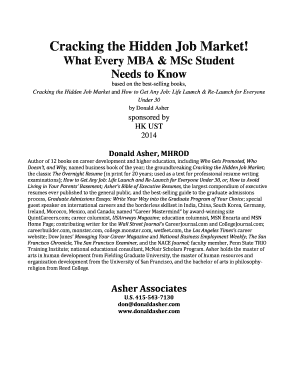Cracking The Private Credit Job Market: 5 Do's And Don'ts

Table of Contents
5 Do's to Land Your Dream Private Credit Job
Do 1: Master the Core Skills
The private credit industry demands a robust skillset. Proficiency in financial modeling is paramount, encompassing Excel expertise, discounted cash flow (DCF) analysis, and valuation techniques. A solid understanding of credit analysis principles, accounting practices, and relevant industry knowledge (e.g., real estate, leveraged finance) is equally crucial. Familiarity with industry-standard financial modeling software like Bloomberg Terminal and Argus is a significant advantage. Demonstrating expertise through certifications such as the Chartered Financial Analyst (CFA) or Chartered Alternative Investment Analyst (CAIA) can significantly boost your application.
- Develop advanced Excel skills, including complex formulas and data manipulation.
- Gain experience with industry-standard financial modeling software like Bloomberg Terminal and Argus.
- Obtain relevant certifications like CFA, CAIA, or other finance-related qualifications.
- Network with professionals in the field to gain insights and build your professional network.
Do 2: Network Strategically
Networking is not just about collecting contacts; it's about building genuine relationships. Attend industry events, conferences, and workshops focused on private credit, private equity jobs, or credit analyst jobs. Actively engage on LinkedIn, connecting with professionals and participating in relevant groups. Don't underestimate the power of informational interviews – reach out to individuals working in private credit to learn about their experiences and gain valuable insights.
- Attend industry events like conferences and networking mixers.
- Actively engage on LinkedIn by joining relevant groups and participating in discussions.
- Reach out to professionals for informational interviews to learn about their careers and gain advice.
- Join relevant professional organizations such as the CFA Institute or other finance-focused groups.
Do 3: Craft a Compelling Resume and Cover Letter
Your resume and cover letter are your first impression. Tailor each application to the specific job description, highlighting relevant experience and quantifiable achievements. Use keywords from the job description to improve your chances of Applicant Tracking System (ATS) success. Showcase your skills and experience in a clear and concise manner, quantifying your accomplishments whenever possible.
- Quantify your achievements using metrics and numbers to demonstrate your impact.
- Use keywords from the job descriptions to optimize your resume and cover letter for ATS.
- Highlight relevant skills and experience that directly address the requirements of the job.
- Proofread carefully to ensure your application is free of errors.
Do 4: Prepare Thoroughly for Interviews
Private credit interviews often involve both behavioral and technical questions. Practice answering behavioral questions using the STAR method (Situation, Task, Action, Result). Prepare for technical questions related to financial modeling, credit analysis, and valuation. Thoroughly research the firm and the interviewer beforehand to demonstrate your genuine interest.
- Practice your interviewing skills using mock interviews with friends or career counselors.
- Prepare answers to common interview questions, focusing on your skills and experience.
- Research the firm and the interviewer to demonstrate your genuine interest and knowledge.
- Prepare thoughtful questions to ask the interviewer to show your engagement and curiosity.
Do 5: Follow Up After Interviews
After each interview, send a personalized thank-you note reiterating your interest and highlighting key discussion points. Consider following up with a phone call a week later to express your continued interest and address any unanswered questions. This demonstrates your enthusiasm and commitment to securing the position.
- Send personalized thank-you notes within 24 hours of each interview.
- Follow up with a phone call a week later to express your continued interest.
- Express your continued interest in the role and highlight your key qualifications.
5 Don'ts for Your Private Credit Job Search
Don't 1: Neglect Fundamental Skills: Don't underestimate the importance of strong foundational skills in accounting, finance, and economics. These form the bedrock of your understanding in the private credit space.
Don't 2: Underestimate Networking: Don't rely solely on online job boards; active networking is crucial for accessing hidden job opportunities and building relationships within the industry.
Don't 3: Submit Generic Applications: Don't send the same resume and cover letter to every firm; tailor your application to each opportunity to maximize your chances of success.
Don't 4: Wing the Interview: Don't go into an interview unprepared; thorough practice and research are key to demonstrating your competence and professionalism.
Don't 5: Forget to Follow Up: Don't assume silence means rejection; a follow-up shows continued interest and initiative.
Conclusion
Securing a position in the private credit job market is achievable with the right preparation and strategy. By mastering core skills, networking effectively, crafting compelling applications, and preparing thoroughly for interviews, you can significantly increase your chances of success. Remember to follow up and consistently demonstrate your passion for private credit. Don't let these crucial "do's" and "don'ts" pass you by – start your successful private credit job search today!

Featured Posts
-
 Morgan Wallens Grandmas Heartwarming Nickname For Him
May 29, 2025
Morgan Wallens Grandmas Heartwarming Nickname For Him
May 29, 2025 -
 Three Injured In Downtown Seattle Shooting Police Investigate
May 29, 2025
Three Injured In Downtown Seattle Shooting Police Investigate
May 29, 2025 -
 Donde Esta Victor Fernandez Su Presencia Hoy
May 29, 2025
Donde Esta Victor Fernandez Su Presencia Hoy
May 29, 2025 -
 Division Streets Air Max 95 97 Ducks Of A Feather When And Where To Buy
May 29, 2025
Division Streets Air Max 95 97 Ducks Of A Feather When And Where To Buy
May 29, 2025 -
 What Founders Learn Analyzing The Reasons Behind Food Startup Failures
May 29, 2025
What Founders Learn Analyzing The Reasons Behind Food Startup Failures
May 29, 2025
Latest Posts
-
 Previewing The 2025 Pro Motocross Season
May 31, 2025
Previewing The 2025 Pro Motocross Season
May 31, 2025 -
 2025 Pro Motocross Championship What To Expect
May 31, 2025
2025 Pro Motocross Championship What To Expect
May 31, 2025 -
 Love Moto Stop Cancer 2025 Online Auction Items Up For Bid
May 31, 2025
Love Moto Stop Cancer 2025 Online Auction Items Up For Bid
May 31, 2025 -
 Pro Motocross 2025 Riders Teams And Predictions
May 31, 2025
Pro Motocross 2025 Riders Teams And Predictions
May 31, 2025 -
 Get Ready Supercross Returns To Salt Lake City
May 31, 2025
Get Ready Supercross Returns To Salt Lake City
May 31, 2025
